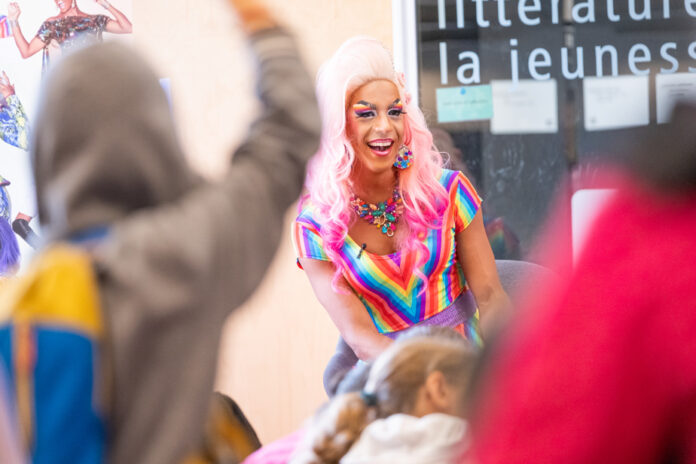The Barbada drag queen enchanted her audience on Tuesday morning at the Grande Bibliothèque, where she read her stories to an audience ranging from 4 to 84 years old. The activity for children went smoothly, under the very discreet protection of security guards.
There were a few dozen spectators, installed in the basement of the Grande Bibliothèque. Toddlers with their parents, older children with their day camp counselors or their grandparents. They were expecting the queen of the morning: drag queen Barbada. Who made a splash: pink wig, rainbow dress, and multicolored eyelids. Even the security guards, posted behind the action, had their eyes riveted on her.
The security guards? Yes, because last April and May, people demonstrated against holding these kinds of activities for children. Inspired by a conservative movement from the United States, these protesters argued that drag queens should not read stories to children. Many states in the US have passed laws to prohibit female impersonators from performing in front of people under the age of 18 – many of these laws have, however, been struck down by the courts.
“I’m not surprised that it comes to us,” admits Barbada, met the day before her reading activity. She is, however, pleased with the difference between the way things are done here and in the United States. In early April, after a protest forced the relocation of one of its children’s readings to Sainte-Catherine, Montérégie, the National Assembly unanimously passed a motion stressing that “drag queens should not, under no circumstances face violent insults, intolerance, hatred for their participation in the reading of children’s stories”.
Seeing the political class rise up to block hatred reassured her.
“That doesn’t mean there won’t be any flaws in that play-off, but it was a clear message, it was a unanimous no. »
The man under the Barbada wigs and makeup has a name. Which is not a secret, but which he now wishes to publicize less. He wants to emphasize his character and not who he is once he takes off his dress and his false eyelashes. As he explains very simply to children before starting to read stories, a drag queen is first and foremost a person in disguise. By fantasy and for the pleasure of playing. Sort of like a Halloween costume.
Barbada has been honing her showmanship for 18 years and it’s no coincidence that she ended up reading stories to children. Under his costume hides a man who has long taught music to primary school children. “There was an adaptation to be made, she agrees, but at the same time, I’ve been doing it for 18 years. I’ve been doing a drag show on Tuesday nights and teaching first grade kids the next day for 18 years. »
Her desire to tell stories to children, which she has been doing especially in libraries since 2017, stems from a kind of professional deformation. Barbada wants to talk about diversity, respect for oneself and others, because it believes that today’s children are and will be “more confronted with difference than any generation before”.
Barbada does not talk about homosexuality, racism or trans identity during its activities aimed at children. Not directly, at least. These things are between the lines. Like in this story of the blue king, who has a wall built to separate the blues from the other colors, but who will have to realize that he needs the other colors. Or as in this other, which she did not read on Tuesday, where it is about a small crocodile who does not like water. Which makes sense, basically, because it turns out to be a dragon…
“I think it’s important that adults do it, in education and elsewhere, with words that children will understand,” she says.
“We can talk about anything, as long as the vocabulary and the manner are appropriate”, Judge Barbada. She doesn’t hammer home any messages other than these: it’s okay to be who you are, it’s okay to be different, and please, if another person seems strange to you, take the time to listen before condemning it. No one is forced to like everyone, but everyone has the right to be heard and respected. “We have two ears and one mouth,” Barbada points out. We should listen twice as much as we talk. »
